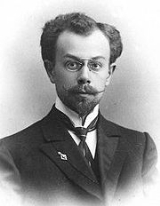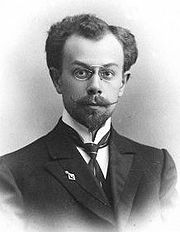
Vikentiy Pashukanis
Encyclopedia

Vikenty Pashukanis was born in Moscow
Moscow
Moscow is the capital, the most populous city, and the most populous federal subject of Russia. The city is a major political, economic, cultural, scientific, religious, financial, educational, and transportation centre of Russia and the continent...
, Russia. His father was a Lithuania
Lithuania
Lithuania , officially the Republic of Lithuania is a country in Northern Europe, the biggest of the three Baltic states. It is situated along the southeastern shore of the Baltic Sea, whereby to the west lie Sweden and Denmark...
n from Kaunas
Kaunas
Kaunas is the second-largest city in Lithuania and has historically been a leading centre of Lithuanian economic, academic, and cultural life. Kaunas was the biggest city and the center of a powiat in Trakai Voivodeship of the Grand Duchy of Lithuania since 1413. During Russian Empire occupation...
and worked as a teacher in the gymnasium
Gymnasium (school)
A gymnasium is a type of school providing secondary education in some parts of Europe, comparable to English grammar schools or sixth form colleges and U.S. college preparatory high schools. The word γυμνάσιον was used in Ancient Greece, meaning a locality for both physical and intellectual...
. Pashukanis graduated from the mathematical department of Moscow University. After graduation he worked as an exciseman. In 1914, Pashukanis became a secretary and a commercial director of "Musaget" - Moscow publishing house of symbolists. After the beginning of World War I
World War I
World War I , which was predominantly called the World War or the Great War from its occurrence until 1939, and the First World War or World War I thereafter, was a major war centred in Europe that began on 28 July 1914 and lasted until 11 November 1918...
Emil Medtner, who was one of the founders and the main owner of "Musaget", could not return from Zurich to Russia. In that time Pashukanis actually controlled the financial activity of "Musaget". In 1915-1917, he negotiated with Alexander Blok
Alexander Blok
Alexander Alexandrovich Blok was a Russian lyrical poet.-Life and career:Blok was born in Saint Petersburg, into a sophisticated and intellectual family. Some of his relatives were literary men, his father being a law professor in Warsaw, and his maternal grandfather the rector of Saint Petersburg...
, over a series of fourteen letters, the publication of his poems which improved for some time precarious financial situation of "Musaget".
In 1915, Pashukanis proposed a re-organization of "Musaget" to make it more profitable; however, E. Medtner declined his proposal. Then, keeping his work in "Musaget", Pashukanis started his own company: "Pashukanis' Publishing". He mainly published the famous contemporary Russian poets: Igor Severyanin
Igor Severyanin
Igor Severyanin was a Russian poet who presided over the circle of the so-called Ego-Futurists.Igor was born in St. Petersburg in the family of an army engineer. Through his mother, he was remotely related to Nikolai Karamzin and Afanasy Fet. In 1904 he left for Manchuria with his father but later...
(who was the most popular Russian poet in 1910’s), Konstantin Bal'mont, Andrey Bely, and Victor Gofman. Books produced by "Pashukanis' Publishing" were elegant and of high print quality.
After the Russian revolution in 1918, Pashukanis was employed as an emissary of the Museum department of People's Commissariat (ministry) of Education. He was responsible for assessing and evacuating the art treasures from the estates abandoned by nobles to Moscow. Russia was involved in a civil war and Pashukanis often had to act in the rebellious regions. Among others, he saved from pillage the collections of Count Radziwill
Radziwill
The Radziwiłł family is an noble family of Lithuanian origin. The descendants of Kristinas Astikas, a close associate of the 14th century Lithuanian ruler Vytautas, were highly prominent for centuries, first in the Grand Duchy of Lithuania, later in the Polish-Lithuanian Commonwealth and the...
from their estate near Bobruisk and the unique collection of Ivan Paskevich
Ivan Paskevich
Ivan Fyodorovich Paskevich was a Ukrainian-born military leader. For his victories, he was made Count of Erivan in 1828 and Namestnik of the Kingdom of Poland in 1831...
from the Gomel Palace
Gomel Palace
The Rumyantsev-Paskevich Residence is the main place of historical importance in the city of Gomel, Belarus. The grounds of the residence stretch for 800 meters along the steep right bank of the Sozh River...
.
In December 1919, Pashukanis was arrested in Moscow. He was indicted for organizing a meeting of the counter-revolutionary group. On December 16, 1919, the head of Museum department, Natalya Trotskaya (wife of Leon Trotsky
Leon Trotsky
Leon Trotsky , born Lev Davidovich Bronshtein, was a Russian Marxist revolutionary and theorist, Soviet politician, and the founder and first leader of the Red Army....
), sent a telegram attempting to save him. On January 13, 1920, he was sentenced to be shot; however, there is no official record that the sentence was carried out.
In 2005, the Belarusian TV and radio company "Gomel" filmed a 26-minute documentary The tragedy of Vikenty Pashukanis.
The cousin of Vikenty Pashukanis, Evgeny Pashukanis
Evgeny Pashukanis
Evgeny Bronislavovich Pashukanis was a Soviet legal scholar, best known for his work The General Theory of Law and Marxism.-Early life and October Revolution:...
(1891–1937), was a famous theorist of Marxist law and a deputy of the People's Commissariate of Justice of the USSR.

